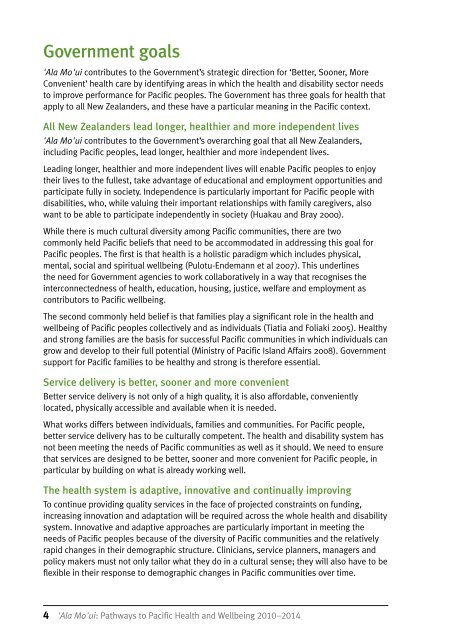Ala Mo'ui - Ministry of Health
Ala Mo'ui - Ministry of Health
Ala Mo'ui - Ministry of Health
Create successful ePaper yourself
Turn your PDF publications into a flip-book with our unique Google optimized e-Paper software.
Government goals'<strong>Ala</strong> <strong>Mo'ui</strong> contributes to the Government’s strategic direction for ‘Better, Sooner, MoreConvenient’ health care by identifying areas in which the health and disability sector needsto improve performance for Pacific peoples. The Government has three goals for health thatapply to all New Zealanders, and these have a particular meaning in the Pacific context.All New Zealanders lead longer, healthier and more independent lives'<strong>Ala</strong> <strong>Mo'ui</strong> contributes to the Government’s overarching goal that all New Zealanders,including Pacific peoples, lead longer, healthier and more independent lives.Leading longer, healthier and more independent lives will enable Pacific peoples to enjoytheir lives to the fullest, take advantage <strong>of</strong> educational and employment opportunities andparticipate fully in society. Independence is particularly important for Pacific people withdisabilities, who, while valuing their important relationships with family caregivers, alsowant to be able to participate independently in society (Huakau and Bray 2000).While there is much cultural diversity among Pacific communities, there are twocommonly held Pacific beliefs that need to be accommodated in addressing this goal forPacific peoples. The first is that health is a holistic paradigm which includes physical,mental, social and spiritual wellbeing (Pulotu-Endemann et al 2007). This underlinesthe need for Government agencies to work collaboratively in a way that recognises theinterconnectedness <strong>of</strong> health, education, housing, justice, welfare and employment ascontributors to Pacific wellbeing.The second commonly held belief is that families play a significant role in the health andwellbeing <strong>of</strong> Pacific peoples collectively and as individuals (Tiatia and Foliaki 2005). <strong>Health</strong>yand strong families are the basis for successful Pacific communities in which individuals cangrow and develop to their full potential (<strong>Ministry</strong> <strong>of</strong> Pacific Island Affairs 2008). Governmentsupport for Pacific families to be healthy and strong is therefore essential.Service delivery is better, sooner and more convenientBetter service delivery is not only <strong>of</strong> a high quality, it is also affordable, convenientlylocated, physically accessible and available when it is needed.What works differs between individuals, families and communities. For Pacific people,better service delivery has to be culturally competent. The health and disability system hasnot been meeting the needs <strong>of</strong> Pacific communities as well as it should. We need to ensurethat services are designed to be better, sooner and more convenient for Pacific people, inparticular by building on what is already working well.The health system is adaptive, innovative and continually improvingTo continue providing quality services in the face <strong>of</strong> projected constraints on funding,increasing innovation and adaptation will be required across the whole health and disabilitysystem. Innovative and adaptive approaches are particularly important in meeting theneeds <strong>of</strong> Pacific peoples because <strong>of</strong> the diversity <strong>of</strong> Pacific communities and the relativelyrapid changes in their demographic structure. Clinicians, service planners, managers andpolicy makers must not only tailor what they do in a cultural sense; they will also have to beflexible in their response to demographic changes in Pacific communities over time.4 '<strong>Ala</strong> <strong>Mo'ui</strong>: Pathways to Pacific <strong>Health</strong> and Wellbeing 2010–2014
















